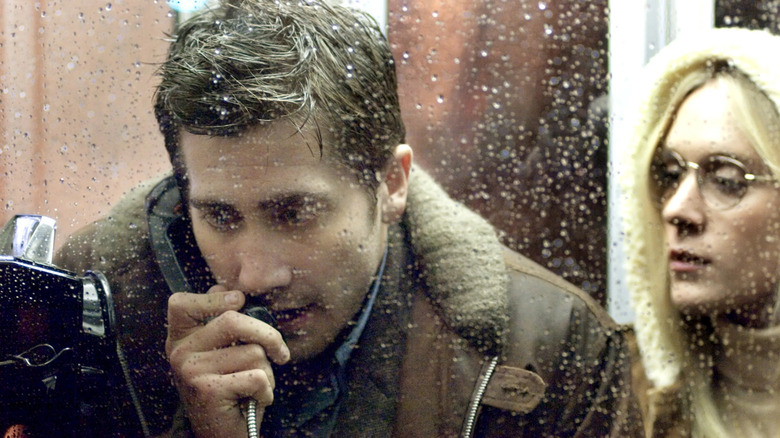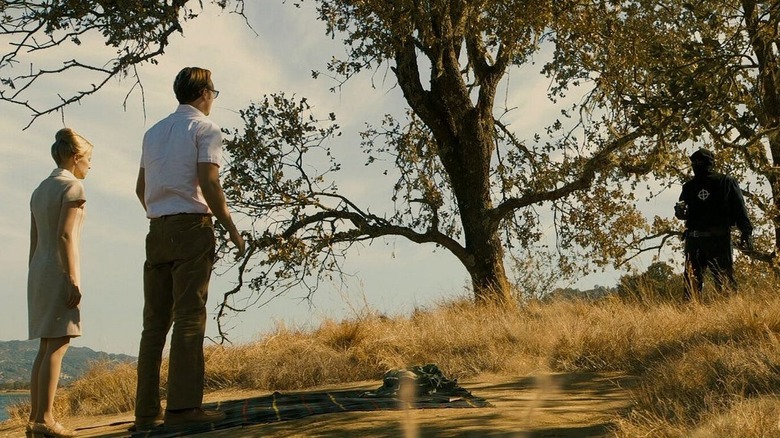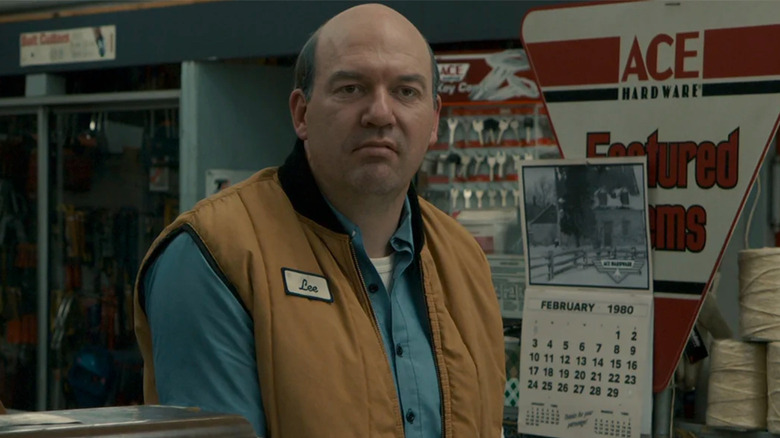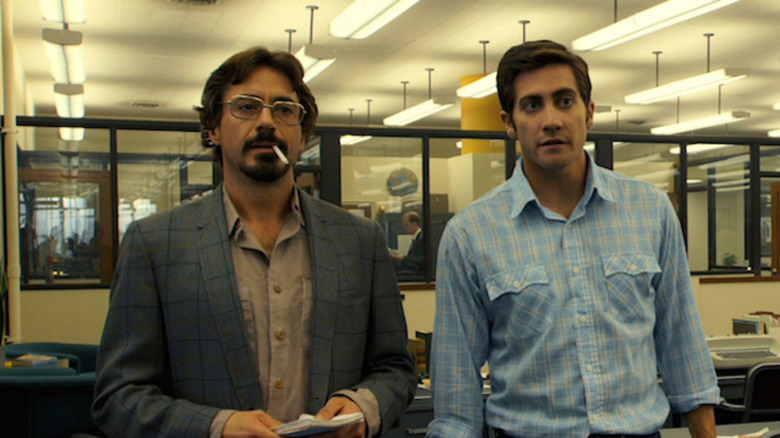Director David Fincher's Best Movie Was A Box Office Failure
David Fincher is an obsessive filmmaker. He's become somewhat infamous for his perfectionism, shooting multiple — some would say exhausting — takes to get what he needs. There's a method to this madness: Fincher is looking for something raw and honest. "I hate earnestness in performance," the filmmaker once half-jokingly said. "Usually by Take 17 the earnestness is gone." It's fitting, then, that Fincher's best film is about obsession. "Zodiac," which hit theaters in 2007 and promptly failed at the box office, is the best work of art the filmmaker has created so far; a brilliant, captivating film that grabs you by the throat from the first frame and doesn't let up. Like the characters who inhabit the movie, we grow obsessed with the story; with the mystery; with the truth that can never really be learned.
Fincher knows a thing or two about serial killers. His thriller "Seven" (or "Se7en" if you want to be a weirdo) effectively made him a star director after the debacle of "Alien 3," and his Netflix series "Mindhunter" is still beloved despite only existing for two brief seasons. But "Zodiac" is not your typical serial killer thriller. Because after the first act of the film, the killer essentially fades into the background. He may or may not pop again, but it's not his story. It's the story of people driving themselves slowly insane trying to find an answer. As the tagline for the film boasted on the posters, "There's more than one way to lose your life to a killer."
The Zodiac Killer stalked Northern California through the late 1960s, changing his M.O. seemingly at random. He targeted individuals. Then he targeted couples. Then he went back to lone victims. And then, most terrifying of all, he vanished into the fog, never to be caught. Like Jack the Ripper, we're obsessed with the Zodiac because we'll never have a definitive answer as to who he was. Sure, there will always be someone who claims they've cracked the case. And there might very well be compelling evidence to back that up. But we'll never really know. Whoever the Zodiac was, he's likely dead by now, and he's taken his secrets to the grave. There will be no trial, no conviction, no peace of mind. His crimes may be over with, but his legend lives on. He's a ghost haunting history.
Three acts
Fincher's "Zodiac," penned by James Vanderbilt, does attempt to solve the mystery, and even comes up with a pretty convincing suspect. But there's no true catharsis here; no satisfaction. In the end, the Zodiac, whoever he was, got away with it. While the film ends with a conclusion, there's still lingering doubt. And that only enhances the obsession. It's part of the brilliance of the film — the not knowing is the point.
"Zodiac" is broken into a very distinct three-act structure. The first act sets up all the pieces while also focusing on the crimes. Vanderbilt's script makes a clever decision: it only shows us the crimes where at least one eye witness survived. The murders that left all the victims dead remain offscreen because we have no way to corroborate what really happened. It's just one of many distinctions the film makes to remain as accurate as it possibly can, because this isn't a serial killer movie, it's a journalism movie. It's "All the President's Men" with a body count.
The second act of the film delves into the police investigation, as detectives Dave Toschi (Mark Ruffalo) and Bill Armstrong (Anthony Edwards) try to crack the case — only to get nowhere. The third and final act is devoted to a different type of investigation: that of Robert Graysmith (Jake Gyllenhaal). Graysmith isn't a reporter — he's a cartoonist who works at the San Francisco Chronicle alongside actual crime reporter Paul Avery (Robert Downey Jr.). But after the police investigation has run dry, and Avery has fled the scene due to substance abuse problems, Graysmith decides it's his job to crack the case.
An unsolved mystery
In the film's telling, Robert Graysmith is like the forefather of the "citizen sleuths" who have become so prevalent in our modern age of non-stop true crime content. Everyday people who take it upon themselves to try to solve a murder mystery with little more than determination and obsession. Sure, Graysmith works for a newspaper — but he's not a journalist when he starts his investigation; he draws political cartoons. But his obsession drives him to the brink — and beyond.
It ruins his life, blows up his marriage, and turns him into an almost raving lunatic as he sprints around Northern California trying to put all the pieces together. Eventually, he arrives on a plausible suspect — Arthur Leigh Allen (a scene-stealing John Carroll Lynch). The film also seems pretty darn convinced that Allen is/was the Zodiac, although in real life, potential DNA evidence all but ruled Allen out.
Whether or not Allen is guilty is almost an afterthought here. You get the sense that Fincher includes that detail because he has to — the story needs a conclusion. The real Graysmith would go on to write a best-selling book about the case, but the fact remains that the Zodiac Killer remains a mystery. For all of Graysmith's sleuthing, we're still left with a big question mark.
A flop that will stand the test of time
Shooting on the digital Thomson Viper FilmStream Camera, Fincher and cinematographer Harris Savides render all of this with a stark, stylish, but grounded look. The period details feel right, the murders that are shown are appropriately horrifying and unglamorized (a lakeside attack sequence early in the film is bone-chilling), and the drudgery and minutiae of obsessive investigation are on full display. Every single second of every frame pops — every detail adds up to something complex. This attention to detail makes "Zodiac" an inherently rewatchable film, even with a hefty 157-minute runtime (there's a director's cut on Blu-ray that stretches things out even further). To rewatch "Zodiac" is to notice a new detail. It's quite simply Fincher's best movie.
And it flopped.
The reported budget was $65 million, but other sources indicate it could've been as high as $85 million. The box office haul? $84.7 million. Critics were kinder to the film, and it has since earned its place as a stone-cold classic. But at the time, audiences seemed uninterested in what Fincher was offering. Perhaps because "Zodiac" is not a traditional thriller like the filmmaker's "Seven." Perhaps the long runtime scared some people off. Perhaps the trailers simply didn't do a good job conveying what was in store. No matter what the reason, it cannot be denied that "Zodiac" was a box office disappointment. But it's also a film that will stand the test of time. When we look back at the great movies of the 2000s, "Zodiac" belongs near the top of the list. It's a film worth obsessing over.



